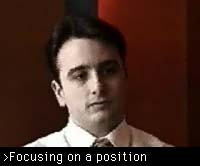 |
|
 |
|
 |
|
 |
|
 |
|
 |
|
 |
|
 |
|
 |
|
 |
|
 |
|
 |
|
 |
|
 |
|
 |
|
 |
|
 |
|
 |
|
 |
 |
|||||||
 |
|||||||
|
Corporate Finance: In a corporate finance position you would work to help companies raise capital needed for new projects and ongoing operations. You would work to determine the amount and structure of fund needs of a client through equity, debt, convertibles, preferred, asset-backs, or derivative securities. As a starting analyst in corporate finance you would usually work on a client team and would have responsibilities to prepare registration statements, attend road shows where investors are sold on securities etc. Merrill Lynch, PaineWebber and Salomon/SmithBarney are acknowledged powers in corporate finance. Sometimes jobs in corporate finance are referred to as investment banking positions. When you hear phrases such as IBD or IBK people are referring to corporate finance.Mergers and Acquisitions: Setting up deals where one company buys another is an important source of fee income for many investment banks. If you go to work in this area you would help out with a team which acts as an advisor to a client, values transactions, creatively structures deals and negotiates favorable terms. Worldwide, Goldman Sachs and Morgan Stanley/Dean Witter are the recognized leaders in M&A advisory. Investment banks have increasingly participated directly in LBOs, spinoffs and bridge loans, often by taking their own investment stake (known as merchant banking). Your duties could involve analyzing the appropriate form of participation. Expect to start running lots of valuation models on spreadsheets and gradually get more client focus as you progress. |
|
|
||||||||||||||||||||
|
Trading: Some of the most desirable jobs in investment banking are in sales and trading. Your responsibilities would involve undertaking transactions in equities, bonds, currencies (referred to as Forex or FX), options or futures with traders at commercial banks, investment banks and large institutional investors. Trading can be tumultuous and requires a thorough knowledge of markets, financial instruments and an intuition for human psychology. Equities trading positions often involve "telling a story" to other traders about why they should purchase your stock. Fixed income trading positions call for strong analytical know-how and the wherewithal to manage large amounts of inventory in an often-thin market. Derivatives traders need very strong analytical know-how (perhaps even an engineering degree). Foreign exchange trading is based more on your instincts about markets, politics and macroeconomics. There are a variety of other types of trading jobs in agency securities, commercial paper, etc. Structured Finance: Positions in structured finance involve the creation of financing vehicles to redirect cash flows to investors (known as asset-backed securities). Typical asset-backs securitize credit card receivables, auto loan receivables or mortgages. This market is red hot in 1998-99 and is likely to grow considerably into the future. Other growth areas include asset-backed commercial paper, collateralized bond obligations (CBOs), and repackaged asset vehicles. It would be beneficial to have a solid combination of spreadsheet, accounting and legal skills. Most students coming out of school know very little about this area; so you can get an edge by educating yourself by reading articles in the area from publications like Standard and Poors CreditWeek and picking up lingo like "early-am risk" from talking to market participants |
|
This will create further specialized job areas. If this area interests you, start studying math (especially stochastic differential equations and derivation of common models like Black-Scholes). Questions about models are likely to come up in interviews. Sales skills are also important in this area. Another related word you will hear is "structured notes." A structured note might be a foreign exchange loan, forward or futures contract with built in options structured to a client's need. So, for example, a client that will no longer be worried about their position once the Yen falls below 85 to the dollar could buy a "knock-out" option on a forward that won't be active once the yen/dollar rate falls below a floor. Advisory: Advisory services are often provided by investment banks to public and private clients involved in M&A and financings. The area of risk management advisory has been popular at many investment banks. Often work will be done to determine a client's value, options for creating value or on a client's industry conditions. |


